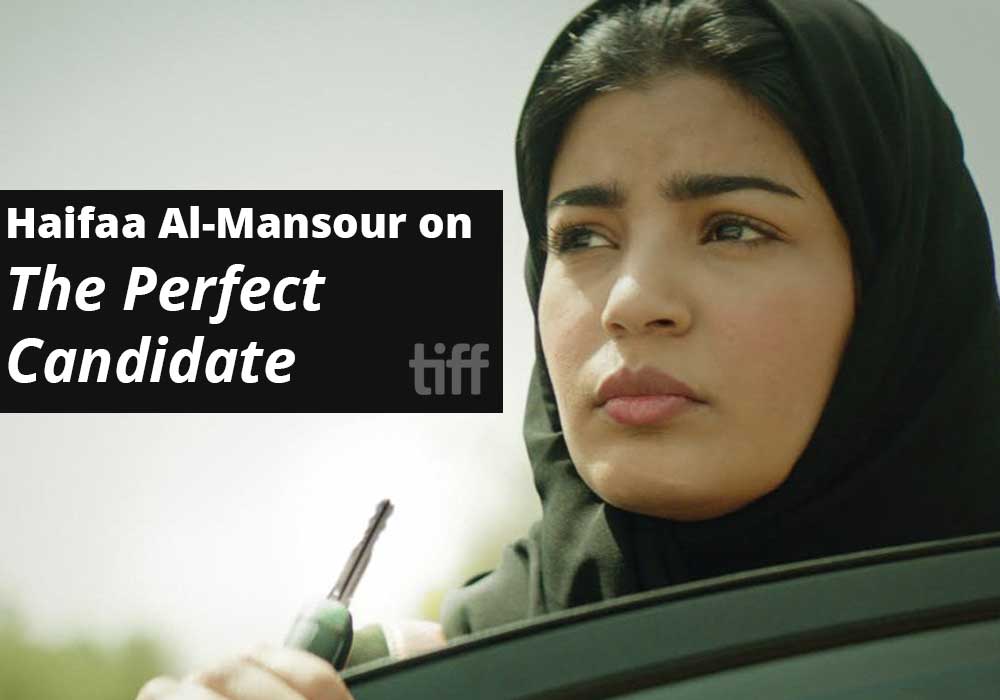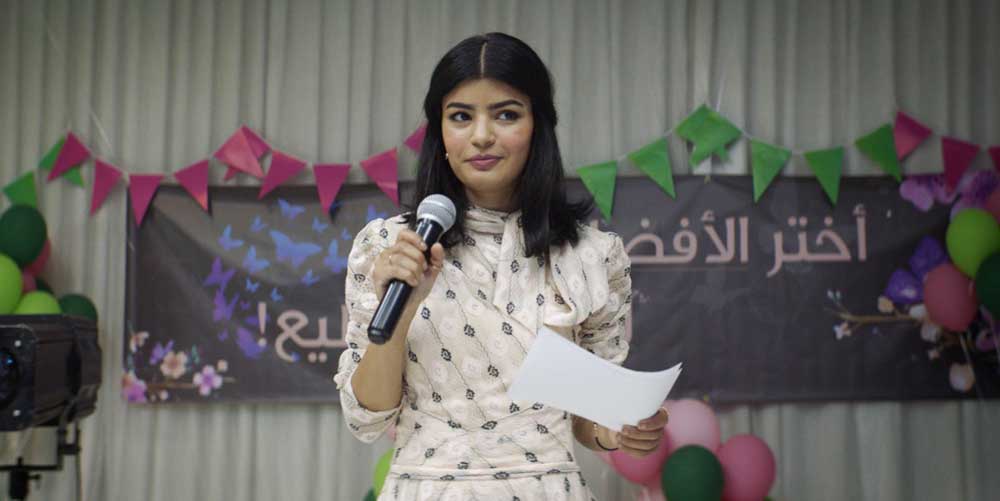Director Haifaa Al-Mansour discusses returning to Saudi Arabia for her fourth feature, The Perfect Candidate, a crowdpleaser about women in politics.

Haifaa Al-Mansour is a trailblazer. Her debut feature, Wadjda (2012), was the first film ever to be shot entirely in Saudi Arabia, a country that shuns the arts — opening a cinema only became legal in 2018. After a few less successful English-language efforts (Mary Shelley [2017] and Nappily Ever After [2018]), Al-Mansour has returned to her native Saudi to make what is arguably her strongest film yet.
“I needed to go home,” Al-Mansour told me. “I wanted to tell stories about people that I know inside out.” The Perfect Candidate sees the filmmaker in her element, working with non-professional actors, and telling a story rooted in home. It’s a highly political film: small-town doctor Maryam (Mila Al Zahrani) almost accidentally applies to run for local office. It’s extremely rare to see a women in politics in Saudi, so Maryam initially has drawbacks. She goes ahead only because winning would mean she can fix the road in front of the hospital, which is currently so damaged that ambulances aren’t able to reach the entrance. Through the process of her campaign, Maryam finds there’s more and more she’d like to change about the way her community is run, and she becomes excited at the idea of gaining power and having her voice heard.
Maryam is no stranger to misogyny: a male patient refuses to be treated by her because she’s a woman even though she’s the only qualified doctor in the building; she is not allowed to travel abroad to a conference because her father is not present to approve her permit. This only worsens when she becomes a politician. The idea of being lead by a woman is so alien to the people of her town that their instinct is to simply laugh her off. Even when she gets the women of the town on her side, she realises that very few of them actually vote, and many of those who do fear that they would be judged if they voted for a woman.
Despite the seriousness of its subject-matter, The Perfect Candidate is also an entertaining crowd-pleaser. It’s funny: Maryam has no idea how to run a political campaign, so she searches the internet, finds an article titled, “10 steps to running a political campaign,” and follows it to a T. We chuckle at her naivete — she sets plans to raise money while not actually knowing what she needs money for — while also admiring the fortitude it takes for her to throw herself into a field she has zero experience in. Like Al-Mansour, Maryam is a trailblazer: there’s no example of a female politician for her to follow, so she has to work it out all on her own. It’s a satisfying hero’s journey, in which Maryam finds her voice and forces her town to listen.
At TIFF, I talked to Al-Mansour about finding that tonal balance and her approaches to working with non-professional actors.
Seventh Row (7R): What was the genesis of the project?
Haifaa Al-Mansour: I did Wadjda [in Saudi Arabia] in 2012, then I did Mary Shelley in the UK, and then Nappily Ever After in the US. I felt like I needed to go home. I felt… not homesick, but like I wanted to tell stories about people that I know inside out. I just felt like I needed something close to me. And then Saudi [passed laws that] allowed cinemas [to open in the country], so I wanted to be part of that.
Also, I feel it is a good time to tell a story about women embarking in politics. It’s a story that women everywhere in the world have: it’s difficult to assert themselves as leaders and see if the general public will elect them and believe in them. Of course, in Saudi, it is very pronounced. Everything there is way more — but I think there is a universality with the woman’s story. There’s a sisterhood in what is happening.
7R: The film centres on a tightly-knit family. How did you work with your actors before you started shooting to build that familial dynamic between them?
Haifaa Al-Mansour: I work a lot with non-professional actors, so they come with their idea of how they see the world. You try to cultivate. I cast people on their essence when I work in Saudi. It’s always about experimenting and always trying to find what clicks.
Putting together the [father’s] band was the most amazing thing for me. In Saudi now, a lot of the good bands are hip-looking and younger, and they are playing a lot because there’s demand for them. So it was hard for me to find anyone, especially people who were free for the time of shooting — and we weren’t paying a lot of money. This is supposed to be the ultimate underdog band of misfits: everyone is overweight; they’re small; but they’re people who feel like home. When I saw them I was like, “I don’t know if they can play…” But they played this beautiful music. It was so touching.
I needed to share part of home with the rest of the world. I hope they enjoy the music from where I come from.
7R: You’re working with non-professional actors who are in front of the camera for the first time. How do you make them feel comfortable in front of the camera?
Haifaa Al-Mansour: It is hard because they are not used to blocking. Shooting a scene is almost geometric, like, “You have to be here, the focus is here, you cannot move your head like that or the light will block you.” They didn’t understand that geometry of it.
With [Khalid Abdulraheem, who plays] the father, I noticed when he played music in one of the band scenes, he was so liberated and so fluid. So we started having him sing, because that is his profession. That is what he feels more comfortable and in command of when he goes on stage. That feeling, it carries off from the stage to acting, and it’s amazing to see how it really empowered him. Initially, he didn’t know how to reveal his emotions… it is not easy to act, to be vulnerable in front of a camera, especially for a Saudi man who is always taught to be strong and powerful. One of the ways is to find how they feel comfortable in their own skin.
7R: Maryam is a wonderful, compelling, and easy-to-root-for character. What was important for you to bring out in her? How did you cast in line with that?
Haifaa Al-Mansour: I think the fire in her heart, feistiness without her being angry, is very important. Women are often shown as angry, and their emotions are judged, so I wanted someone who can bring this feistiness but still maintain dignity. It’s not being angry and upset, it’s not that energy. Mila [Al Zahrani, who plays Maryam] is an aspiring TV star. I talked to her. She looked the part; she’s the right age. I sent her the script, and she read for me, and it was amazing. I thought, “Yeah, she can do it. She is the person I’m looking for.”
7R: The film explores how a patriarchal system oppresses women, but it’s also a fun film — a crowd-pleaser. How did you find that balance?
Haifaa Al-Mansour: Saudi is very exotic, by itself, so I didn’t want to make a film that alienates the world or makes it more inaccessible. I grew up in Saudi Arabia watching a lot of American cinema and a lot of mainstream cinema, and for me, that is how I fell in love with the medium. I wanted to make a film that people can enjoy and have fun.
The world itself is very hilarious. It’s so absurd, right? Like, a woman running for office by accident, anywhere in the world, would be hilarious, but let alone in a place that is segregated! So everything in there built itself somehow.
I want to bring a lot of important issues and a lot of powerful messages, things that are important to me as a woman and as a filmmaker. But I don’t want to lose sight of being an entertainer. They go hand in hand.

7R: I think your portrayal of men in the film is interesting: some are overtly sexist, but many are kind and well meaning, like the father. But their hands are still tied by a patriarchal system.
Haifaa Al-Mansour: And I show women in the same way. It is not like men versus women; that is not the story. It is everybody against a system that is marginalising. Men are forced to take care of women. They are all tied to the same place, and whatever they think or do is dictated by similar ideas circulating in the society.
I also didn’t want to go into the trap of Middle Eastern films with the father as the patriarch, the angry guy who beats his kids. That is real for certain people, but it is not the only thing. It is just one of the many layers for manhood in the Middle East. Men are always the villains… which they are, to a certain degree! But that is just one part of manhood, and I want to celebrate the other part so they will see themselves differently and recognise a different path.
7R: It was an interesting choice of yours to depict a family unit with three independent daughters and their father, but no mother. Even though it’s a film about women, they don’t have that mother figure.
Haifaa Al-Mansour: Yeah, but that mother figure… we killed her! She was there [in the original script], but she was taking air from everybody. It was an amazing character, but she’s taking air from the main character. Maybe in a different film. But even when she is dead, her presence is very strong.
7R: I thought it was interesting that a large portion of the film is spent away from Maryam and with the father on his music tour. Why did you think it was important to make that a significant part of the story?
Haifaa Al-Mansour: Art is coming back to Saudi Arabia, as well as increased liberties given to women. We’ve been through a very radical phase in Saudi where there’s a push back against a lot of conservative, radical Islamic ideas about pushing women and art from public life.
I think it’s amazing to bring art to very conservative societies. Change becomes more fundamental and more real. It might take time for people to understand and value but that elevates it. That is how civilisation is built, so it’s something I wanted to celebrate.
Also, my mom loves film, loves music. I grew up with her singing… she comes from a family that would not allow their daughters to become singers. I think if she was born into a different world, she would be an amazing star. She has all the charisma. I was ashamed of her when I was a kid; I didn’t want her to do that. I wanted to give a nod to her in the film, because that is what defiance is: to be true to yourself. It’s not about carrying slogans and going out in the street. Defiance starts in the heart. That is why she [Maryam] sings in the film.
7R: Maryam is the only one of her sisters who wears a niqab in the film. Can you talk about the clothes she wears in the film and what they represent in Saudi culture?
Haifaa Al-Mansour: In Muslim culture, the women dress not for themselves but to protect a political agenda, right? It’s political or religious identity; it’s never the woman’s identity, who she is. She projects where she comes from. A lot of women say, “No, we do it because this is our choice,” but it is really the way we are programmed.
For me, Maryam hated her parents being musicians. She hated being in the spotlight. So she chose to conceal her identity and just be part of the crowd [by wearing the niqab]. But when she is in direct contact with the world at the TV station, she wants to claim that identity. I think it is important for a woman to claim their identity and show their face.
7R: Do you have any particular cinematic influences?
Haifaa Al-Mansour: Not really. I love some Iranian cinema, people like Jafar Panahi. He’s in prison now under house arrest. I like how he deals with the world with a lot of heart, and he brings a lot of absurdity to everyday life. I wouldn’t say I’m influenced by him, but I understand that type of film.
I love the Dardenne brothers. Rosetta is amazing. The way they focused on the character and brought her to life… it’s an unforgettable character because she is so driven. It’s amazing, the way they brought that character to life.
7R: What are you working on next?
Haifaa Al-Mansour: I go from here to Virginia to shoot an episode of The Good Lord Bird, which is [based on] a novel by John Brown that won the Pulitzer Prize. It stars Ethan Hawke, and I’m making it for Showtime. I’m really excited about the show. We will be shooting outdoors all the time: very humid, lots of mosquitoes.
Discover more of the best acquisition titles at TIFF19 >>

